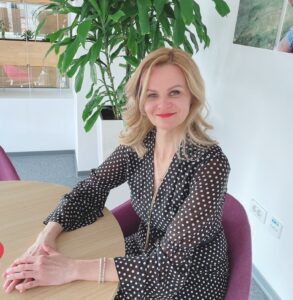Takeda Croatia wins the Family-Friendly Employer award from the Ministry of Demography and Immigration of the Republic of Croatia.
This recognition from the Croatian Ministry of Demography and Immigration truly validates our commitment to our people, says Mrs Viktorija Zadro Huml, General Manager for Takeda in Croatia, Slovenia, Bosnia & Herzegovina. A Family-Friendly Employer title is not just an award; it’s a testament to our focus on creating a workplace where employees thrive personally and professionally, says Mrs Zadro Huml. In the interview for Diplomacy&Commerce, we discussed the acceptance of digital transformation and artificial intelligence in the pharmaceutical industry in Croatia.

- How do you assess the ultimate needs of your product users, and how does this fit into the needs and development of the industry?
At Takeda, the needs of our patients are at the core of everything we do. We strive to deeply understand patient journeys, their challenges, and preferences, which guide our science and innovation. This begins with gathering insights through direct interactions with healthcare providers, and communities worldwide. By blending market insights with robust research and innovative technology, we align our products with the industry’s evolution. Whether it’s deploying advanced data analytics or collaborating globally on breakthrough advancements, we’re committed to creating therapies that serve unmet medical needs and ultimately improve lives.
- Do we know how far we can go in AI and therapies such as gene and RNA-based treatments?
While AI’s potential feels limitless, we approach its integration thoughtfully and responsibly. At Takeda, AI is already aiding us in areas like drug discovery, genomic data analysis, and predictive modeling—accelerating innovation cycles. For therapies like gene and RNA-based treatments, AI not only identifies promising drug candidates faster but also personalizes approaches based on patient profiles. We recognize, however, that ethical considerations, such as patient data privacy, and scientific challenges still shape how far we can proceed. Takeda remains highly invested in exploring AI’s possibilities alongside world-class partners to ensure these tools are reliable, safe, and transformative.
- Can we expect greater collaboration between industry, technologists, academics, and patient groups to advance treatment for new rare diseases?
Absolutely. Addressing rare diseases requires intensive collaboration and shared expertise, and Takeda is proud to be at the forefront of facilitating those partnerships. By integrating technologists’ capability to sift through big data, academic expertise to validate scientific discoveries, and patient groups that provide real-world perspectives, we’re making strides in developing more effective targeted therapies. One example is our Rare Diseases Innovation Hub, which fosters such collaborations globally to advance research, improve diagnostics, and enhance access for patients. As these partnerships grow, they continue transforming how rare diseases are treated and understood.

- How quickly are everyday drugs advancing, and how much use do they have today? Are they popular in our region?
Everyday drugs remain vital for treating common, chronic conditions, though innovation often pivots toward specialized therapies. In regions like Croatia, Slovenia, and Bosnia & Herzegovina, accessibility to these medicines is paramount, and Takeda continuously works to ensure availability. We also observe remarkable progress: formulations with fewer side effects, optimized dosing schedules, and more patient-centric delivery mechanisms are the new standard. This progression reflects changing patient expectations and the integration of cutting-edge technology, such as AI, in improving medications. Traditional drugs are still widely utilized in our region, though tailored solutions are advancing to meet specific patient demographics.
- In what direction will your development move globally, and how do you see this development in our region?
In my countries, Takeda is focused on addressing some of healthcare’s greatest challenges through innovation, with priorities in gastroenterology, oncology and rare diseases. Sustainability is also a critical pillar, embedding environmental and societal impact into our operating model. In Eastern Europe, including our region, we continue adapting efforts to local healthcare frameworks, ensuring accessibility and aligning with our patients’ needs. By fostering collaboration with local partners, healthcare providers, and policymakers, we empower communities and enhance healthcare delivery systems. Our regional focus goes beyond medicine—we prioritize engaging stakeholders to improve education and infrastructure critical for the future of healthcare.
- How do you achieve such a desirable business environment? How much does this award mean to you as a leader?
At Takeda, we foster this by embedding initiatives such as flexible working arrangements, support for mental health, family-centric benefits, and skill development programs. As a leader, my vision is to nurture trust and inclusion—ensuring each team member feels valued and empowered. Ultimately, this creates the foundation for a high-performing workplace full of motivated individuals aligned with Takeda’s mission. The content of this email and of any files transmitted may contain confidential, proprietary or legally privileged information and is intended solely for the use of the person/s or entity/ies to whom it is addressed. If you have received this email in error you have no permission whatsoever to use, copy, disclose or forward all or any of its contents. Please immediately notify the sender and thereafter delete this email and any attachments.